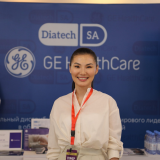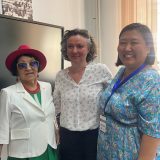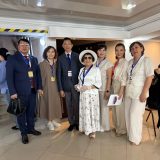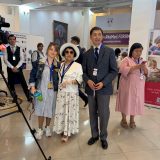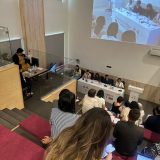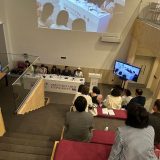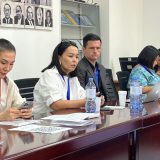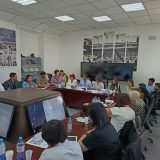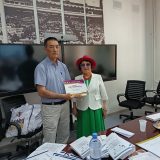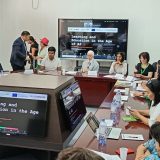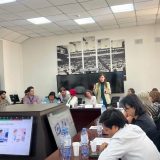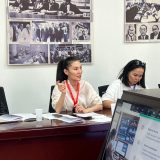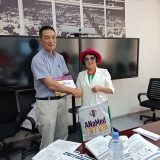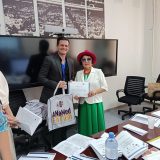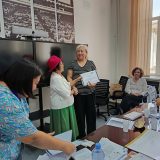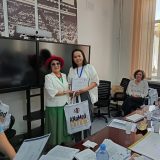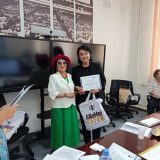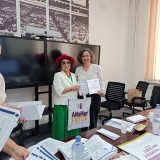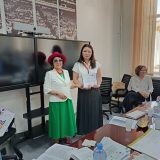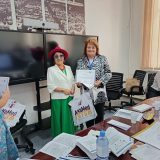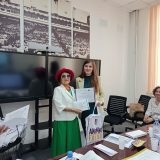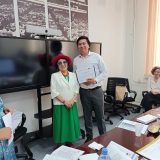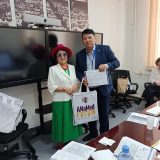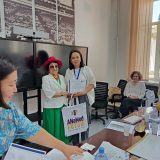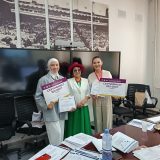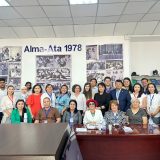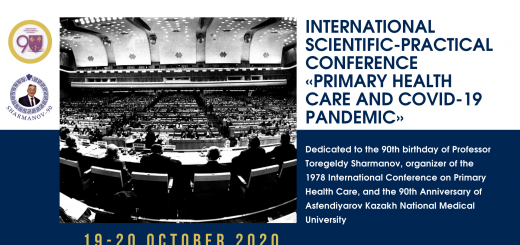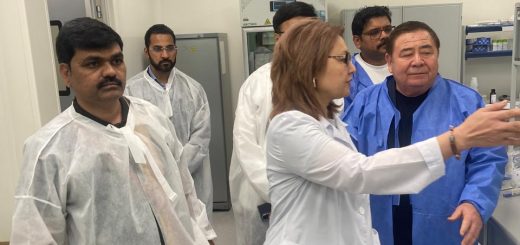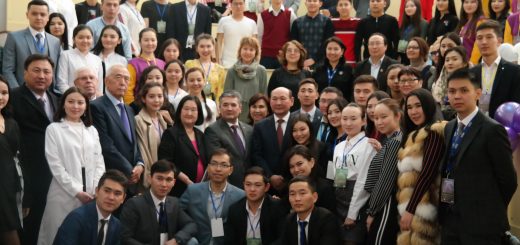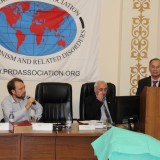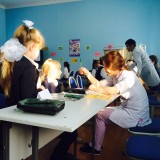ERASMUS Plus BERNICA International Conference: Enhancing Educational and Scientific Capacity in Nutrition and Dietetics in Central Asia.
As part of the International Forum “ANaMed Forum – New Generation 2025,” held on June 4–5, 2025, the International Educational and Scientific Conference titled “The Impact of the ERASMUS Plus BERNICA Program on the Development of Educational and Research Potential in Nutrition and Dietetics in Central Asia in the Context of Sustainable Development Goals” took place.
The conference was hosted by the “Center for Innovation in Education and Research in Occupational and Environmental Hygiene” at S.D. Asfendiyarov Kazakh National Medical University (KazNMU).
The main goal of the section “Building Educational and Research Capacities in Nutrition and Dietetics in Central Asia” was to enhance the educational and research capacity of higher medical educational institutions in Central Asia through training sessions, master classes on developed modules, and international experience exchange.
The BERNICA Project (Building Educational and Research Capacities in Nutrition and Dietetics in Central Asia), funded by the European Union, is implemented under the ERASMUS+ program with participation from universities in Central Asia and Europe, aimed at developing curricula and research competencies in nutrition and dietetics.
This section of the Forum became a key milestone in implementing the project’s goals and the ERASMUS Plus program overall. The Forum platform provided a vital foundation for strengthening collaboration among partner universities at the international level to boost their educational and scientific capacities.
The conference gathered 55 participants, including faculty from KazNMU and professors from international and CIS universities—Turkey, Austria, the USA, Italy, Iran, the United Kingdom, Kyrgyzstan, Uzbekistan, Tajikistan, and Kazakhstan. A total of 50 oral presentations were delivered in a hybrid format (offline/online). Additionally, more than 30 undergraduate, master’s, and PhD students participated, showing great interest in the presented modules and actively engaging in discussions.
The conference, held in the context of the Forum, was organized by:
- Toguzbayeva Karlygash Kabdeshevna – Coordinator of Erasmus Plus projects: CANERIEH, TUTORIAL, HARMONEE, BERNICA in the Republic of Kazakhstan and NJSC «Kazakh National Medical University named after S.D. Asfendiyarov», Doctor of Medical Sciences, Professor of the Department of Public Health of D. Asfendiyarov Kazakh National Medical University.
- Kenesh Dzhusupov – Central Asia Coordinator for Erasmus Plus projects (CANERIEH, TUTORIAL, HARMONEE), European Coordinator of BERNICA, Associate Professor and Head of the Department of Public Health at the International Higher School of Medicine of the International University of Kyrgyzstan.
- Gaziz Duisenbekovich Naduev – Deputy Director of the Scientific and Practical Center for Sanitary and Epidemiological Expertise and Monitoring of the Republic of Kazakhstan.
- Assel Kalykova – Deputy Head of the Department of Sanitary and Epidemiological Control of Almaty, Republic of Kazakhstan.
The organizers and partners faced important tasks:
- Utilize the ANaMed Forum – New Generation 2025 platform to strengthen the educational and research potential of the Central Asian region in promoting healthy nutrition and improving public health;
- Study the experience of developing and implementing innovative nutrition and dietetics curricula in accordance with Bologna principles and ENQA standards through a series of training sessions;
- Organize the exchange of knowledge and best practices with international experts to enhance the research and innovation capacity of KazNMU in the field of nutrition and dietetics;
- Strengthen regional and international ties through joint initiatives and sharing of advanced experience in education, research, and practice in nutrition and dietetics.
The trainers were specialists of international and republican levels:
- Kenesh Dzhusupov – Associate Professor, Head of the Department of Public Health of the International Higher School of Medicine, Coordinator for Central Asia of the Erasmus Plus Program: CANERIEH, TUTORIAL, HARMONEE, BERNICA European Coordinator.
- Professor Toguzbayeva Karlygash Kabdeshevna – Doctor of Medical Sciences, Professor of the Department of Public Health of S.D. Asfendiyarov Kazakh National Medical University, coordinator of the CANERIEH, TUTORIAL, HARMONEE and BERNICA projects of the ERASMUS Plus program in the Republic of Kazakhstan and S.D. Asfendiyarov Kazakh National Medical University.
- Senior E-Learning Expert Anastasia Sfiri – FH JOANNEUM University of Applied Sciences, Graz, Styria, Austria.
- Fatmanur Özürek Arpa – Faculty of Health Sciences, Department of Nutrition and Dietetics, Istanbul Medipol University, Istanbul, Turkey.
- Beisbekova Arailym Kairatovna – PhD, Associate Professor of the Department of Nutrition named after Academician T. Sharmanov of S.D. Asfendiyarov Kazakh National Medical University,
- Khozhamkul Rabiga – Assistant of the Department of Biostatistics and Fundamentals of Scientific Research, S.D. Asfendiyarov Kazakh National Medical University
- Sokolov Dmitriy Konstantinovich – Assistant of the Department of Public Health of S.D. Asfendiyarov Kazakh National Medical University.
Over the two-day conference, participants attended training sessions and master classes based on the following modules:
- The relationship between intestinal microbiota and diet.
As part of the educational training, Dr. Fatmanur Özürek Arpa presented a scientific perspective on the complex mechanisms of interaction between nutrition and the gut microbiota. The speaker spoke about how the diversity and composition of the microbiota (bacteria, viruses, fungi, etc.) directly depend on a person’s diet and lifestyle, affecting such aspects of health as immunity, metabolism, and even the psycho-emotional state. Particular attention was paid to the role of probiotics, prebiotics and fermented foods, as well as the prospects for personalized nutrition in disease prevention;
- Functional Foods and Their Health Effects: Functional Proteins and Bioactive Peptides.
In the second training, Dr. Arpa took a closer look at functional foods, foods that have additional health benefits. The focus was on proteins and bioactive peptides that can regulate physiological processes and reduce the risks of chronic diseases. The presentation included examples of natural sources, technological approaches to the production of peptides (fermentation, hydrolysis) and the results of clinical studies confirming their antioxidant, antimicrobial and immunomodulatory effects. Data from the doctor’s dissertation research on bioactive peptides from lupine were also presented;
- Empowering Students in the Age of AI.
During the International Educational Days in Almaty, Anastasia Sfiri presented an innovative approach to learning in the context of the rapid development of generative AI. In her presentation, she highlighted how modern technologies are transforming the role of the teacher and the student, focusing on learning through interaction, storytelling, simulations, project and problem-oriented activities. Particular attention was paid to the importance of critical thinking, feedback, motivation and involvement of students in the decision-making process. Spheeri presented examples of the use of AI tools such as ChatGPT, Perplexity, Synthesia, Fobizz, and others, highlighting both their potential and risks, such as standardization of knowledge, loss of autonomy, or distortion of identity. She proposed strategies for integrating AI into human-centred learning at all stages and called for inclusive and motivating learning environments that foster growth and meaningful learning;
- Nutrition in COPD.
The COPD Nutrition Course introduces healthcare professionals to the basics of nutritional support for this category of patients. Particular attention is paid to weight management, prevention of muscle atrophy and energy deficit, as well as the use of oral and enteral nutrition. The goal of the course is to teach how to form personalized nutritional recommendations for patients with COPD, taking into account the severity of the disease, age and comorbidities;
- Human Nutrition.
This course covers the fundamental principles of nutrition, the role of macronutrients, micronutrients, hydration, and how to assess energy balance. Students will learn how to analyze the nutritional value of products, assess the needs of the body and develop a diet that supports health and physical activity;
- Advanced Nutrition and Dietetics in Metabolic Syndrome.
The course provides in-depth knowledge about nutrition in obesity and type 2 diabetes mellitus. The training is based on modern clinical guidelines and practical skills, from assessing nutritional status to building personalized nutrition strategies, including meal replacement. The course is designed for graduates who want to delve into the topic of metabolic syndrome;
- Mental health.
The intensive course aims to explore the relationship between nutrition and mental health. It includes theoretical and practical training in the creation of diets for mental disorders, burnout syndrome and autism. Students will learn how to assess eating habits, form diets and understand the role of nutrients in mental well-being;
- Nutrition in Elderly.
The course reveals physiological changes with age and their impact on nutrition. Common problems (deficiencies, dehydration) are discussed, as well as dietary recommendations that take into account social, cultural and economic characteristics. Upon completion, participants will be able to develop balanced diets to improve the quality of life of elderly patients;
- Nutrition For School-Aged Children.
The course focuses on healthy nutrition for school-age children, taking into account the regional recommendations of Central Asia. Participants will learn about key nutrients, the formation of eating habits, the influence of family and media on the choice of products. Particular attention is paid to the prevention of diseases associated with nutritional imbalance in childhood;
- Old Products – New Components.
The course examines changes in the composition of products under the influence of environmental factors, storage and agricultural technology. Attention is paid to nutrigenomics, aquaponics, as well as the analysis of scientific publications. Upon completion, students will be able to assess the impact of the external environment on the quality of food and make recommendations to prevent unwanted changes;
- Sports nutrition.
This course highlights the role of nutrition in maintaining and enhancing athletic performance. Bioenergetics, nutrients, body composition assessment, the impact of deficiencies and the effectiveness of food supplements are studied. The course is suitable for both professional athletes and anyone who wants to integrate nutrition into an active lifestyle;
- Clinical Nutrition Practice in Chronic Kidney Diseases.
The course is suitable for students interested in nephrology and nutrition and is focused on nutritional support for patients with CKD of different stages. Participants will learn how to develop nutritional strategies for complications such as hyperkalemia and hyperphosphatemia, calculate protein intake, and provide counseling.
These modules were developed under the BERNICA project by an international team of public health and nutrition experts and are intended for integration into medical university curricula.
The section’s themes and training modules were closely aligned with the United Nations Sustainable Development Goals (SDGs 2, 3, 4, and 17) – ensuring healthy lives, quality education, partnerships for the goals, and ending hunger.
Utilizing the ANaMed Forum platform allowed for the successful implementation of the BERNICA scientific-educational section, which contributed significantly to strengthening the educational and research potential of the Central Asian region in promoting healthy nutrition to improve population health.
All participants received Forum participation certificates and speaker certificates. Additionally, upon completion of the training program, participants were awarded international-standard certificates equivalent to 12 academic hours.
Future cooperation is planned within the BERNICA project working group for the implementation of developed modules into educational programs. Organizers have also outlined plans for future training sessions and master classes for a broader audience from both academia and public health sectors.
The organizers express sincere gratitude to all participants, trainers, and national and international partners, as well as to S.D. Asfendiyarov Kazakh National Medical University for their contribution to the implementation of the BERNICA project through the ERASMUS+ program.
Follow Erasmus+ in Kazakhstan:
- 🌐 Website: erasmus.kz
- 📘 Facebook: NEO KZ 2023
- 📸 Instagram: @erasmusplus_kazakhstan
- 📢 Telegram: NEO_KZ_2023
- ▶️ YouTube: NEO KZ 2023
- 📂 Google Drive with useful materials: Google Drive



